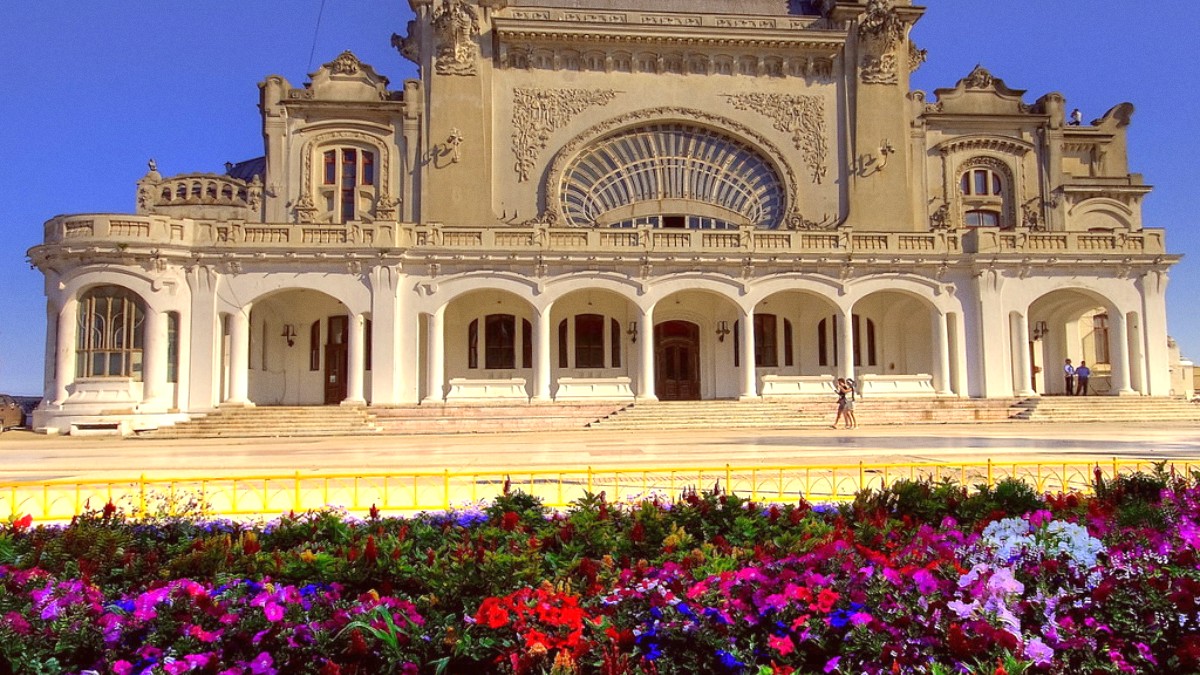
Northern Dobrogea, Romania
The city experiences four distinct seasons, each offering a different atmosphere and range of activities.
Climate Patterns Throughout the Year
Summer (June-August): This period has the warmest weather. Average temperatures generally stay between 20-30°C (68-86°F). Some days, temperatures climb above 35°C (95°F). High humidity near the coast is common. Rainfall is usually low, with occasional short thunderstorms. These often provide a refreshing break from the heat.
Autumn (September-November): Autumn offers mild and pleasant conditions. Temperatures gradually decrease from around 20°C (68°F) in September to 10°C (50°F) by November. Rain becomes more frequent, specifically in late autumn. Humidity remains moderate, and the coastal air feels crisp.
Winter (December-February): Winter arrives with cold temperatures, averaging around 0-5°C (32-41°F). Temperatures drop below freezing, and snowfall occurs periodically. Strong winds from the Black Sea make the air feel colder than the thermometer indicates. Precipitation is moderate, often falling as snow.
Spring (March-May): Spring brings a gradual warming trend. Temperatures rise from 5°C (41°F) in March to 18°C (64°F) in May. Moderate precipitation is common, and the landscape turns green.
Choose your travel period to align with your interests:
Beach Activities and Water Sports: July and August offer the best conditions for swimming, sunbathing, and enjoying water sports. Sea temperatures reach their highest, and resorts are fully operational.
Cultural Sightseeing and Historical Exploration: May, June, September, and early October offer pleasant temperatures without intense summer heat or large crowds. These months suit walking tours, museums, and archaeological sites comfortably.
Photography: Shoulder seasons provide clearer skies and softer light, which photographers find helpful for capturing the city's beauty.
Budget Travel: The low season from November to April offers the lowest prices for accommodation and flights. This period offers an opportunity to experience the city without tourist bustle, focusing on indoor attractions and local life.
July, August
Warmest beach weather, all attractions open, nightlife.
Crowded, highest prices for accommodation and services, booking needed.
May, June, Sep, Oct
Pleasant temperatures, fewer crowds, lower prices, cultural exploration.
Sea might be too cool for swimming in May or Oct, some seasonal attractions may close.
November-April
Lowest prices, very few tourists, authentic local experience, museum visits.
Cold weather, many beach-related businesses closed, limited direct flights.
As of March 31, 2024, Romania joined the Schengen Area for air and sea borders. Full integration for land borders remains pending.
No specific health-related entry requirements are currently for general tourism to Romania. Routine vaccinations are a good practice before any international trip.
Valid for at least three months beyond your planned Schengen Area departure. Issued within the last 10 years.
Recent passport-sized photos may be necessary for visa applications.
Mandatory for Schengen visa applications. It covers medical emergencies and repatriation, with minimum coverage of €30,000.
Border control officers may request proof of your return ticket or onward travel plans.
Hotel bookings or an invitation letter from your host.
Romania offers a more affordable travel experience compared to many Western European countries, but costs vary based on your travel style.
Romania’s currency is the Romanian Leu (plural: Lei), abbreviated as RON. Symbols used include "L" or "lei". Coins come in denominations of 1, 5, 10, and 50 bani (100 bani equals 1 leu). Banknotes are available in 1, 5, 10, 20, 50, 100, 200, and 500 lei.
Tipping is customary in Romania and appreciated for good service.
These are approximate costs and fluctuate based on season and individual choices.
Constanțan is generally a safe city for tourists.
Required Vaccinations: No specific vaccinations are for entry to Romania for most travelers.
Recommended Vaccinations: Routine Vaccinations: Measles-Mumps-Rubella (MMR), Diphtheria-Tetanus-Pertussis (DTP), Varicella (chickenpox), Polio, and an annual flu shot. Hepatitis A and B: Especially for travel to rural areas, extended stays, or frequent street food consumption. Rabies: For outdoor activities or animal contact, as rabies is present in wildlife. Consult a travel health professional four to six weeks before your trip.
Call 112 for all emergencies: police, ambulance, and fire department. This number is free from any phone.
Crime and Safety Concerns: Constanța is generally safe. Pickpocketing occurs in crowded areas. Vigilance with belongings is important.
Scams: Be aware of common tourist scams, specifically currency exchange or unsolicited help from strangers.
Constanța has several public and private hospitals, including the Constanța County Emergency Hospital. Private clinics often offer faster service and may have English-speaking doctors.
Pharmacies are widespread and well-stocked. Pharmacists offer advice for minor ailments and dispense many over-the-counter medications. Many operate 24/7.
EU citizens carry their European Health Insurance Card (EHIC). Non-EU citizens rely on their travel insurance for medical coverage.
Tap water in Constanța is generally safe to drink by local standards. For sensitive stomachs or peace of mind, Bottled water is widely available and recommended.
Restaurants typically adhere to good hygiene standards. Street food is popular; assess cleanliness of vendors before purchasing.
Romania is in a seismically active zone. Constanțan experiences tremors, but severe earthquakes are rare and have less impact on the coast.
| Category | Details | Recommendation |
|---|---|---|
| Petty Crime | Pickpocketing occurs in crowded areas, on public transport, in markets, and at tourist sites. | Be vigilant with belongings. |
| Taxis | Some drivers might try to overcharge. | Use licensed taxis or ride-sharing apps like Uber or Bolt. Confirm meter use or fare before starting. |
| Neighborhoods | No specific "no-go" neighborhoods. | General precautions after dark. Stick to well-lit and populated areas. |